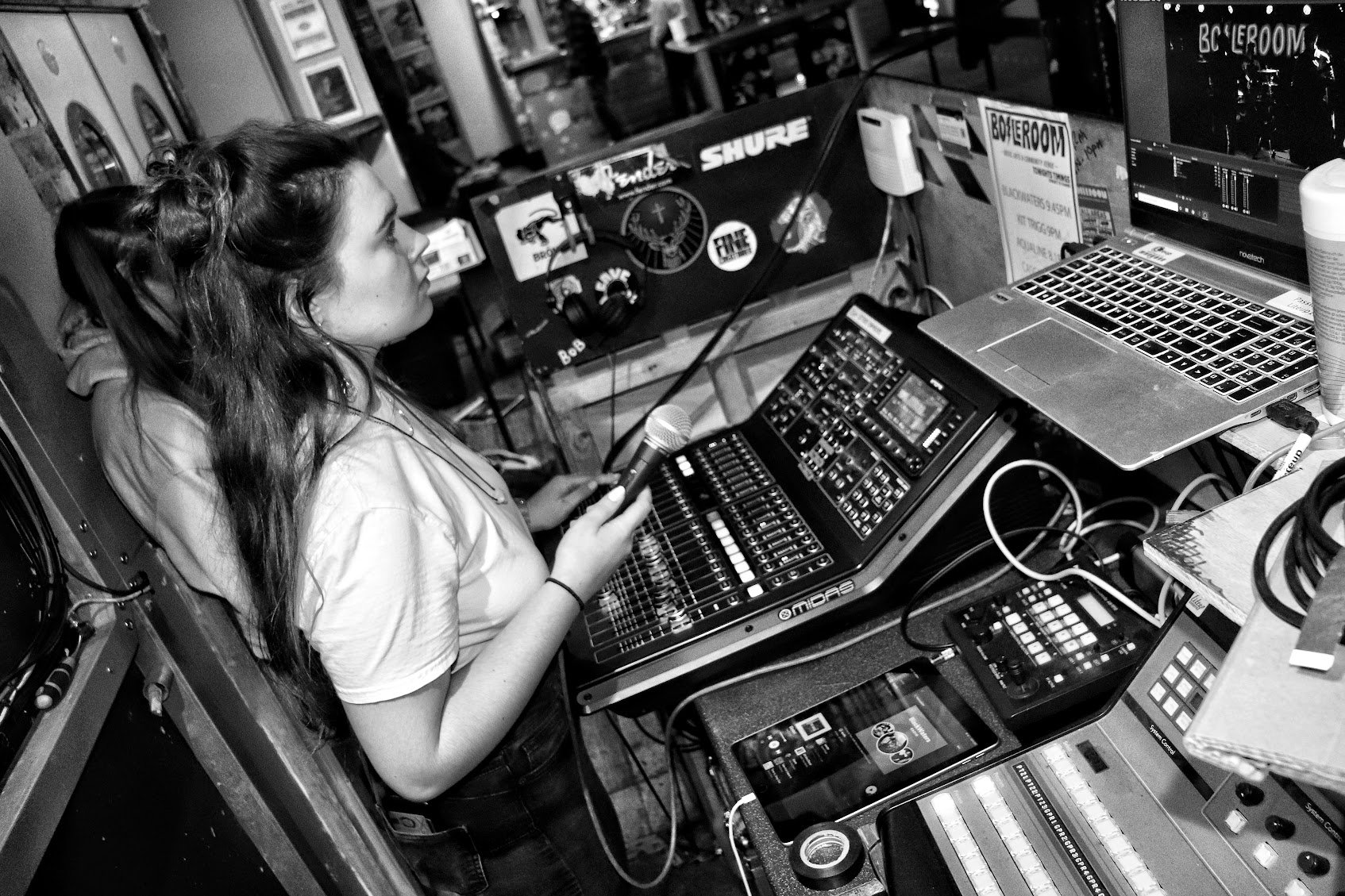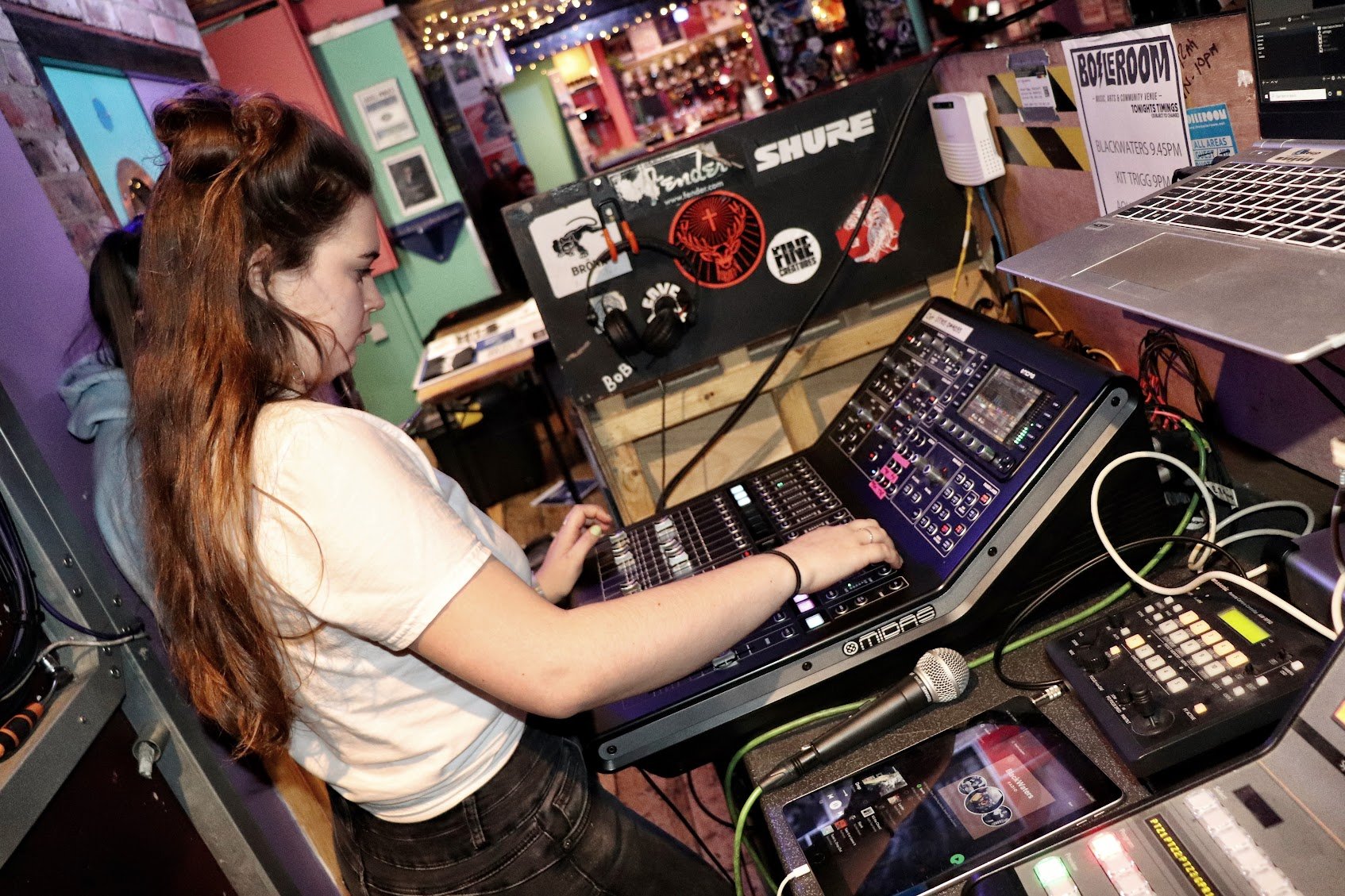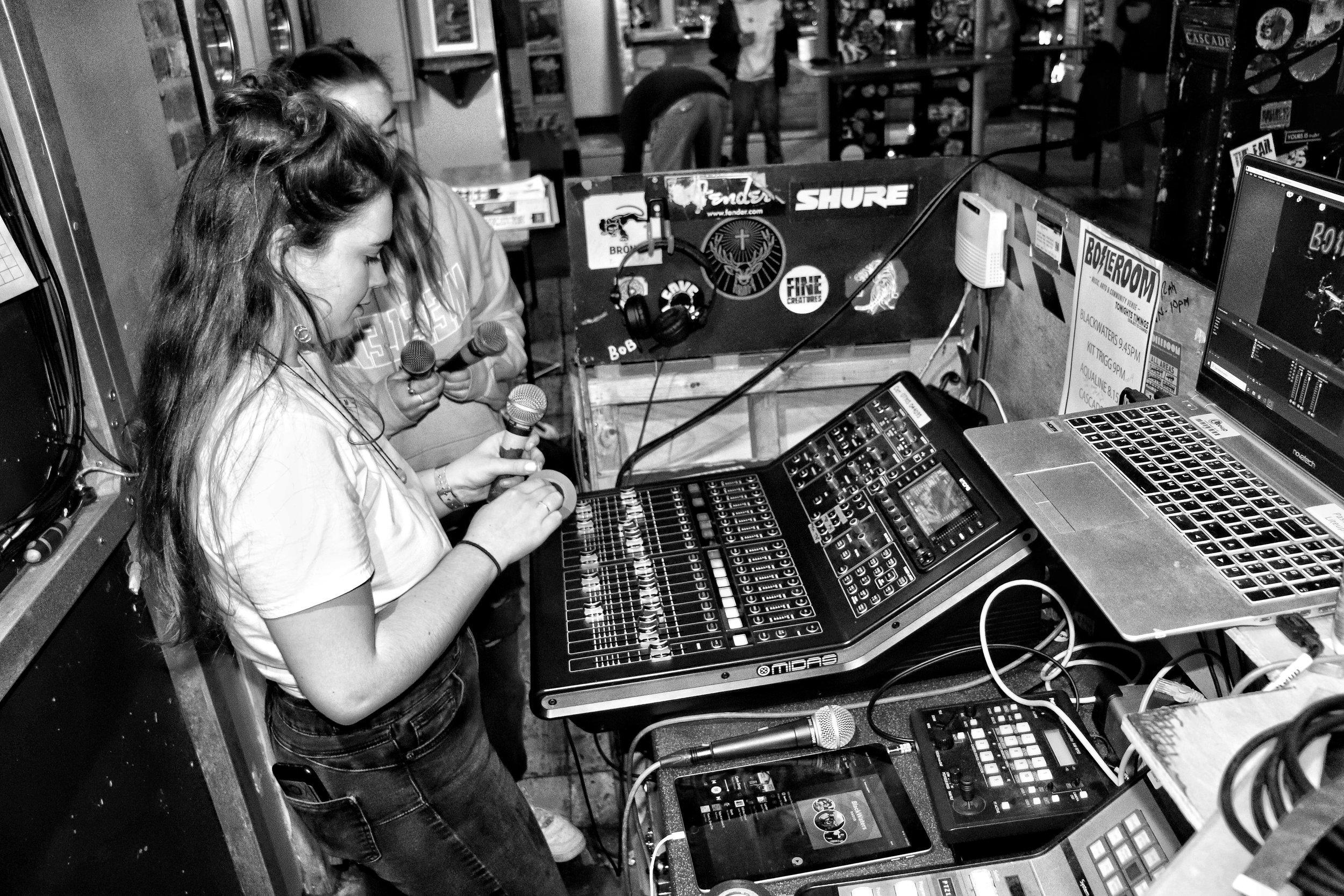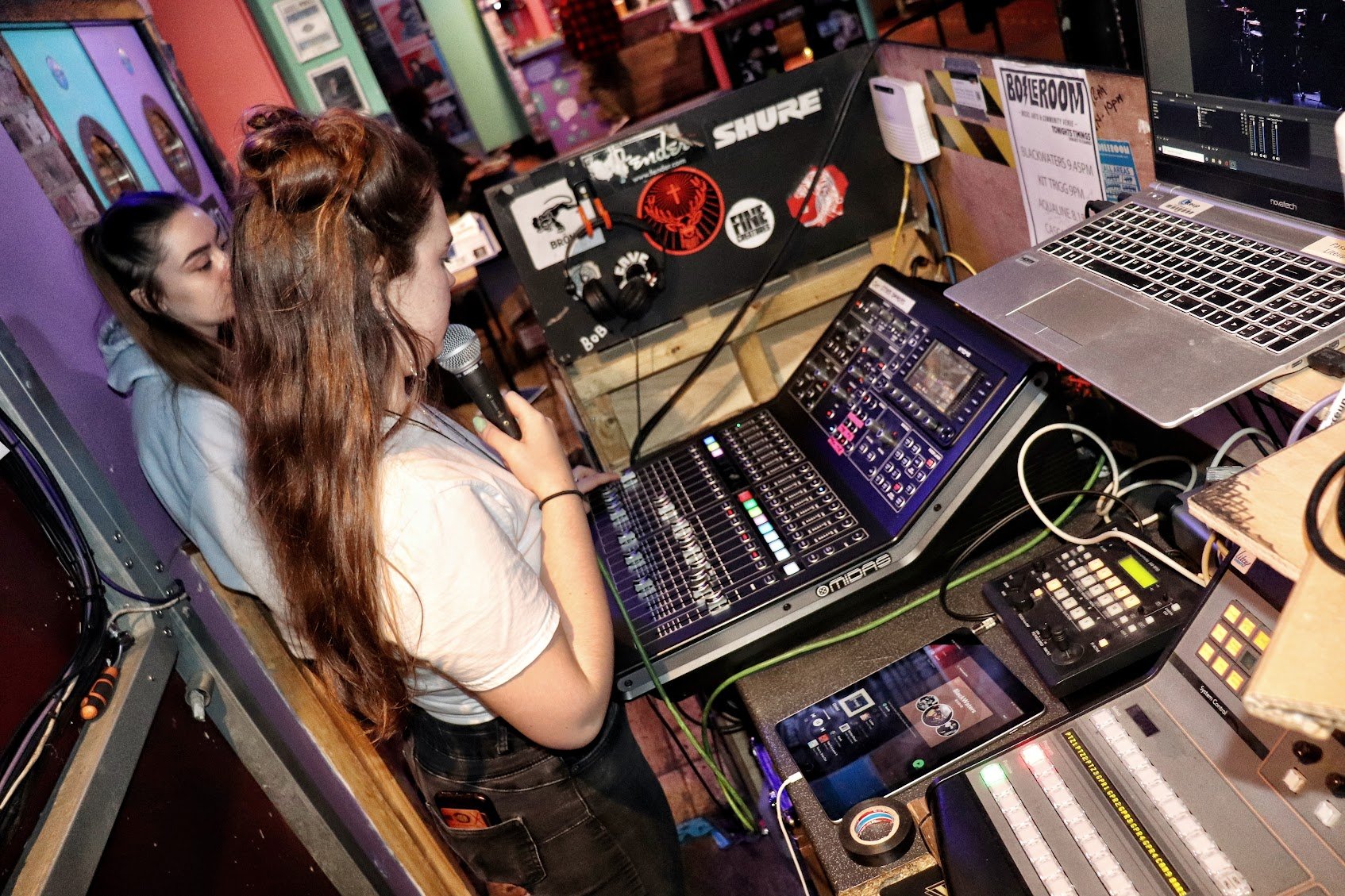IN CONVERSATION WITH BETH DENTON, HEAD SOUND ENGINEER AT THE BOILEROOM
“It’s difficult to see yourself in a role when none of your role models are similar to you.”
The Boileroom’s 2022 roster includes shows from exciting bands such as Porridge Radio, KEG, and The Lounge Society - but what goes on behind the scenes to make these gigs happen? Beth Denton talks to VOCAL GIRLS about the ups and downs of her role as Head Sound Engineer at the renowned venue, providing an insight into an often overlooked sector of the music industry.
Thanks for chatting with us, shall we start with a little introduction?
My name is Beth Denton (she/her), I’m 21 years old and I am Head Engineer at The Boileroom in Guildford.
Had you always intended to work in the music industry? If so, what initially drew you to sound engineering?
I have always been interested in music. It’s funny - even my nursery progress reports would pick up on how much I responded to music and making sound. In the past I've learnt a bit of piano and cello, had singing lessons and joined a church choir. I also played guitar, I formed an acoustic duo with a friend, took music theory exams, and did band workshops through sixth form. The band workshops are where I got really nosey about how gigs actually work and I started having a go on the analogue mixer for the first time, then I started to help run the sessions.
Before you joined The Boileroom, what steps were you taking to pursue this as a career?
I was just starting my degree at ACM Guildford when I met someone from The Boileroom and got involved with the venue. My degree was Music Industry Practice in Technical Services and Live Sound Engineering - a bit of a mouthful! The degree was obviously very beneficial to me, but I don’t think I would have done nearly half as well without the real venue experience I gained at the Boileroom.
For anyone that doesn't know, what is it exactly that a Sound Engineer does?
In short, we run the sound check and technical side of the show. I help the artist load in and set up, mic everything up, soundcheck each instrument, set monitoring for each band member. We then run through sections of songs for them to make sure they’re comfortable and can hear themselves and each other, and for me to balance the levels of the instruments. I do this for each act then put barriers up if needed, clear the floor for doors, and make the space feel vibey with music, lights and haze. I check in with each artist before they go on stage, keep everything moving on time, mix lights and sound for their sets, and maybe even record and vision mix using our cameras if I feel up to it!
After the gig I pack down all our mics and cables, help the bands pack their stuff up, sweep and mop the stage, put barriers away, turn everything off safely, and send off any recordings. Hopefully in that time I’ll have found time to chat to the artists and their crew - that’s honestly the best part of the job. Sometimes I’ll have met 10, maybe 15 lovely new people in one shift! Occasionally I’ll have had a shadow with me and I’ll have been chatting through everything I’ve been doing so that they can watch and learn.
Tell us a little bit about The Boileroom? What first drew you to it?
I think I’ve always grown up around the small business mindset. At the time, what drew me in was my appreciation for the love, the individuality, and the hard graft that goes into places like that. Now that I’m part of the team, I love that people notice the fact that we care so much about the venue. We have an all female management team which I think gives it a different feel to most other venues. It’s not painted all black as well so it is light and welcoming, and people always say that it smells so nice!
How exactly did you get involved with The Boileroom?
I shadowed engineers there for a really long time until I felt confident that I could run an event myself. I shadowed for far too long to be honest - I realised I was ready when an engineer I was shadowing made a mistake and I thought “oh, I wouldn’t have done that!”.
There appears to be a significant gender imbalance in this sector of the music industry, do you have any thoughts on this or why this could be the case?
I do find it strange but I understand why young women wouldn’t jump into the role - I'm even taken by surprise when I find a female live sound engineer. It’s that lack of representation which is the problem. It’s difficult to see yourself in a role when none of your role models are similar to you.
Has this gender imbalance ever affected you personally?
I think every woman in the music industry will have stories to tell. I think I get some funny reactions from some artists and touring engineers, partly because I’m young as well, but my best defence at the moment is just to keep smiling and carry on with my role. At the end of the day, as long as I’ve done my job and got the gig running smoothly, chances are I’ll work with lovely people at the next event.
What do you think can be done to encourage more people from marginalised genders to pursue a career in sound?
I’m doing what I can in my own small way! I try to take on a new person to shadow me every few weeks. I have found that probably 60% of the people who approach me are female and I try to encourage those women as much as possible and give them every opportunity that comes my way.
What would you say is the most challenging part of your role?
My current challenge is that I find it difficult to decide whether to call people out for treating me differently, or just let it pass me by and not affect me. I definitely feel like I have to prove myself a lot more due to being a young woman. Quite often, I feel like I’ve won some respect by the end of the gig, but I very rarely get told that. I notice that people become less patronising the more they work with me!
What would you say is the best thing about being a Sound Engineer?
I used to think it was a very thankless job. No one seemed to look my way unless something was going wrong. I’ve found since the pandemic that more artists, touring crew, and audience members say thank you for a good gig. Perhaps it’s just that everyone has more of an appreciation for live music now and those who make it possible.
What is your favourite memory from working at the boileroom?
I have a few but my most recent was a sold out gig. The artist and I had a disagreement throughout soundcheck about having the barrier up. It needed to be up to keep our equipment and the audience safe, but he insisted that he knew better than me. During the gig and on stage in front of the full room of people, he said “Beth you were right”, and I will keep that with me forever. I think it’s the first time anyone has ever admitted that in front of a crowd!
Can you recall any interactions with other people in the industry that have really stuck with you or helped to inspire your work?
Yes! We work with EM Acoustics. They installed our amazing PA system and have come to our external gigs to set up the system. The best thing about the guys from EM is that when we met they immediately treated me as a professional. It sounds ridiculous to say as I know that I am a professional but it was such a shock for them to trust that I knew what I was doing and treat me with respect. They allowed me to make decisions and take the lead and it gave me such a confidence boost. I normally prefer to work alone as then I know that I can take charge and not be shut down. This experience made me realise that not everyone will talk down to me.
What advice would you give to someone wanting to pursue a similar job role who doesn’t know how to start?
I think the best thing to do is to reach out to either an engineer or a venue who can get you in to learn. You can learn so much from watching someone at work. Find out what equipment they use and watch as many YouTube videos on it as you can, so you can ask questions and get involved quickly.
On another note, there’s a lot to be said for those who are genuinely a joy to have on the team, just due to the way they interact with artists. I personally need to feel confident that the people who work for and with me are giving the best impression of the venue. It’s so important to show initiative and a genuine interest in making the gig the best it can be. In my opinion, half the job is technical and half of it is hosting.
Are there any opportunities that you or the Boileroom itself offer to people who want to get involved?
Yeah, I am always happy to hear from people who want to shadow or do gigs. I have a lot of people approach me so sometimes it’s a bit of a wait for availability. People who email me with a killer introduction and show real passion are my favourite!
This sector is undeniably male-dominated; a 2019 article claimed that in the UK, only 5% of audio engineers are women. Furthermore, the Grammy for Producer of the Year (Non-Classical) has never been won by a woman. It’s hard to know for sure why there are less women in these behind-the-scene roles, but we can say with certainty that the lack of representation plays a part. Not only are young women not seeing a lot of people like them in these positions but there is also a lack of support and accessible information that lets them know these career avenues are open to them.
Although these numbers can be discouraging, there are so many brilliant women who are thriving within this industry, including Beth, that not only show us that women can do these jobs, but that they can do them amazingly well. We could wish for nothing more than for more women to explore this side of the industry, so if you want to hear more about Beth and her work you can keep up with her via her Instagram @bethdentonsound and find her email address. If you would like to know more about The Boileroom or possibly catch a gig there you can visit their website https://www.theboileroom.net or their instagram @boileroom.
Image Credits: Nicole Osrin | @nicoleosrin





